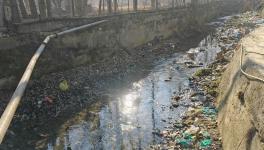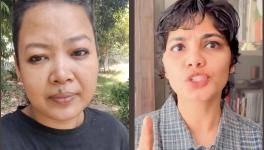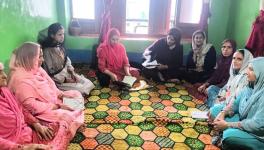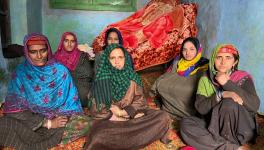Killed as Human Shield: A Tale from Kashmir
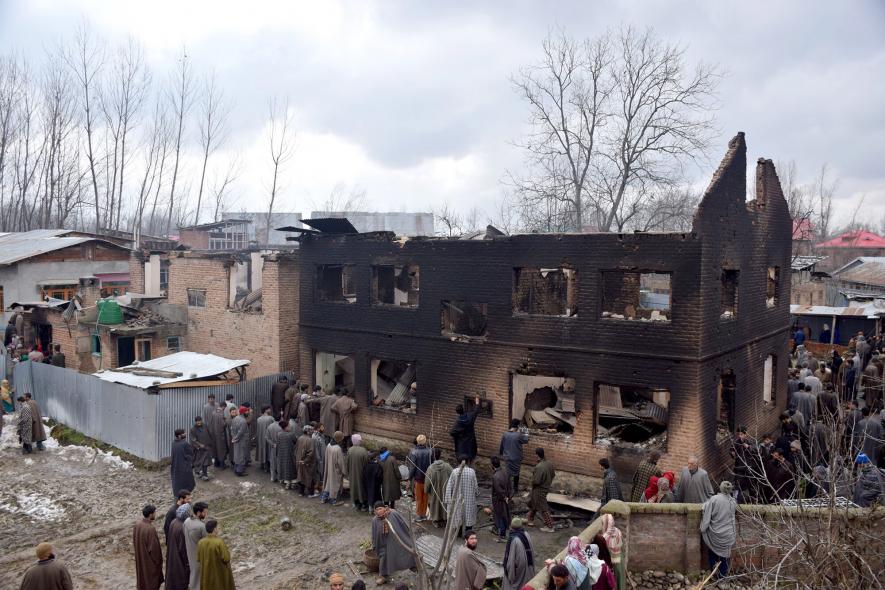
Three residential buildings destroyed during the ambush in Pinglan, Pulwama. Image Courtesy: Kamran Yousuf
Since the 1990s, using Kashmiri locals as human shields has been a practice followed by the government forces during ambush and gunfights. Many people have been killed, injured and tortured in the process.
In South Kashmir’s Pulwama district, these happenings are the same. Since February 2019, two civilians have been killed, one injured and another tortured severely.
On May 16, 2019, the 10th day of Ramadan, the announcement for Sehri (breakfast before dawn) was made around 3 AM. In Pulwama, 27-year-old Rayees Jalal Dar was up by 2 o’clock to offer Tahajjud (an Arabic word for night prayer) and read the Holy Quran, which was his daily routine.
Living in a two-story house in Dalipora, a small village just 1.5 kilometres from Pulwama town, all the members of the Dar family, including Rayees’s father, Jalal-U-Din Dar (45), mother Mehmooda Begum (40), elder brother Younis Jalal (32), and their younger sister sat down for Sehri.
Before anyone could start eating, they heard noises in the courtyard. Within no time, the door of the house was banged upon, with someone shouting, “Darwaza Kholo (open the door)”. “I stood up quickly and rushed to check on the door,” said Younis. As soon as he opened the door, he encountered a few men in uniform, who had trespassed the main wall of the house to reach the door. Before anyone could figure out what was going on, one of the men from the platoon, asked Younis and Rayees to guide them to locate a house.
“We both resisted, as it was time to eat our Sehri, but they didn’t listen to us, they forced us to go along with them. After arguing for a couple of minutes they took us away,” said Younis. He added, “I was walking followed by Rayees. Behind him, there were 9 armed forces personnel. I thought they had come to detain someone.”
It was a joint team of 44 Rashtriya Rifles (RR) (a wing of Indian Army) and a Special Officers Group (SOG) of Jammu and Kashmir police who were carrying out cordon and search operation (CASO) to ambush the militants present in the village.
Also read: Non-Stop Killings: One Civilian, Four Militants Killed In Kashmir
Unaware about army strategy, Younis reached the gate and opened it, as one of the armed men ordered both the brothers to go inside to check if there was any militant in the house.
“The situation was tensed, they were abusing us. If I wouldn’t have listened to them, they could have beaten or killed me, as one of the armed men was holding the barrel of his gun on my neck,” Younis recalled. Rayees was immediately behind Younis actively listening to the orders.
Both brothers were pushed inside the gate while the forces remained outside in the lane. “I could hear my heart beat loudly, while walking towards the house,” said Younis. He said that he kept shouting that he is a civilian with every step he took. Before he reached the house, the forces behind him started firing indiscriminately, one piercing Younis’s right thigh.
“I wasn’t able to decide where to go. I thought I have bullets all over my stomach, I crawled and reached a nearby house. I found my family and neighbours were there. But no one had any idea where Rayees was,” he said. He tied a piece of cloth on his leg to stop the bleeding.
“They saved themselves and used us as human shields. We were under threat, there was no option apart from following their orders,” he added.
Militants who were hiding in the house, managed to escape but they were trapped in a paddy field, a few metres away from the house. Younis’s maternal uncle, Mohammad Yaqoob Dar who was also present in the house, managed to take him out after fighting with the policemen. They scrambled into the police jeep and requested them to drive to the Sub District Hospital (SDH) Pulwama.
At around 7:30 AM, a few more civilians were asked to check if there is any militant in the house. No militant was there, but they found Rayees in a room lying in a pool of blood. An eyewitness, R* (name withheld), said, “I saw a few locals carrying Rayees on their shoulders. They placed him near a shop where an armed vehicle was placed.”
Jalal recalled, “Within no time, firing between forces and militants started in the fields. One of the army personnel was shot dead. Forces didn’t go to pick the body of their colleague. I, along with one of my neighbours were dragged out of the house and were asked to pick up the body. He didn’t have any idea that his son who was famous in the locality for being religious and modest, had been killed. The gunfight intensified.
Keeping Rayees under the rusted tin sheet for an hour, a neighbour reached Jalal and told him about Rayees. All of them rushed to the spot and retrieved his body.
Younis who was admitted in the hospital, left as soon as he learned about the killing of his brother, to see him for the last time and attend his last rites. His freshly bullet-injured hand held the other uninjured hand to place his brother Rayees in the grave.
At the end of the ambush, three militants were killed and three troopers were injured.
“I don’t understand, why armed forces involve civilians in their operation. In these gunfights, civilians have no role to play,” said Younis.
Earlier Incidents
This is not the first incident of using civilians as human shields in Kashmir.
Jammu and Kashmir (J&K) is one of the top militarised zones of the world. Kashmir has remained as a disputed region between India and Pakistan since the countries became independent. Apart from natural beauty, Kashmir is famous for human rights violations, use of non-lethal weapons such as shotguns, civilian killings and tortures by the government forces.
Also read: 1 Civilian, 1 Trooper Killed, 98 Injured in Kashmir
Just six kilometres from Dalipora, Pinglan, a village surrounded by crop fields and Chinar trees witnessed the bloodiest days on February 17-18, 2019.
On February 17, at around 11:30 PM, 45-year-old Mushtaq Ahmad Bhat was sitting in his bed calculating the sales he had made in the day. He had a general store located at the main road a few metres away from his house. His 40-year-old wife Nusrat Jan, was busy in the kitchen with washing dishes. Meanwhile, their two daughters Muminah Mushtaq, 16, and Munisah Mushtaq, 11, were in the another room. The silence of the night was broken by noise in the courtyard, as it was filled with armed forces.
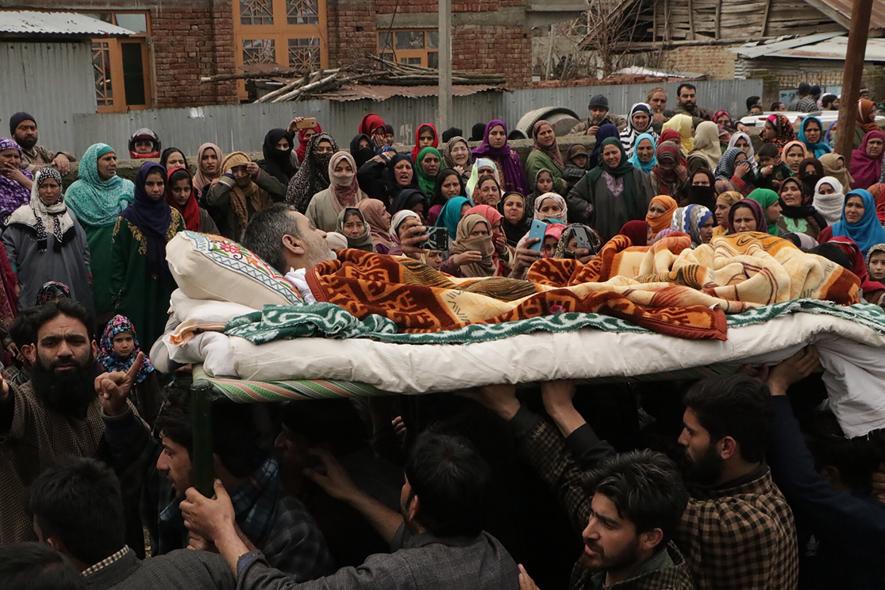
Residents carrying dead body of Mushtaq Ahmad Bhat in Pinglan, Pulwama. Image courtesy: Kamran Yousuf
“I ran towards my husband, to inform him about the activity in the courtyard. I heard loud bangs on the door, before I could reach him,” said Nusrat.
The couple checked their daughters to see if they were safe, before opening the door. Mushtaq headed towards the door quickly as the banging intensified. As soon as he opened the door, armed forces barged inside.
“They asked my husband to accompany them, saying that they want to search our house to trace if any militant was hiding in our house,” said Nusrat.
She said that the forces rummaged every corner of the two-storey house, but didn’t find anything. Once done, they asked Mushtaq to come out and started searching the courtyard. After a 15 minute long hunt, they found nothing. “At last, they asked my husband to go with them and carry out the searches in the other neighbouring houses, but we resisted. I failed, I was afraid to stop them due to the guns in their hands. They drove him out,” she added. Muminah recalls, “I told them we don’t have a brother so please let him be with us. I begged them to have mercy on us.”
Nusrat and both sisters were asked to go inside and lock the door. “We went upstairs and continued to look at him till the cowshed, after which we couldn’t see him anymore,” Muminah said.
A neighbour who lives opposite to Mushtaq’s house was able to see what his family couldn’t. Due to the fear of being killed or tortured, he wished to be known only by his middle name, Ahmad. Ahmad and his family were sitting in the lobby with the forces surrounding them. They could see clearly what was going on in Mushtaq’s courtyard. “Lights were installed at every possible point in the area. Forces were placed at every step of the area,” he said.
Also watch: Kashmir: Migrant Child's Eye Damaged by Pellet Injury
“A few gunshots were fired. I saw Mushtaq was walking as he was followed by the armed forces. A few more gunshots were fired and then I saw Mushtaq lying on the floor. Before I could see anything more, forces drew the curtains and locked us in a room. After that no one knows what happened outside,” said Ahmad.
Mushtaq’s family were asked to move out and were placed in Ahmad’s house. They were locked in a separate room. Even though Nusrat kept enquiring about her husband, no one told her that he had been killed.
Nearby, Mushtaq’s younger brother Shafqat Ahmad Bhat (40), who lives in the next lane was sitting in a room with his wife Shazada Begum, 38, octogenarian mother Aazi, and their three children, to make them feel safe.
At around 12:30 AM, a platoon of forces came to Shafqat’s house and searched it in every possible way. “Two parties searched our house. They didn’t find anything. In the second round of searching, they dragged me out to the main road and started beating me ruthlessly,” Shafqat said.
“After a horrifying round of torture, they placed me in a Casper armoured vehicle. Forces were agitated and angry as they were not able to locate the militant in the area,” he added.
“They were talking to their informer over a wireless placed in the vehicle, I heard them asking about the exact whereabouts of the militant, to which the voice in the wireless said to fire a few shots and they will retaliate. I was scared as their anger was rising with every second,” Shafqat recalls.
Not knowing about his brother’s killing, forces gave him a mobile phone and ordered Shafqat to go to one of his neighbours’ houses and shoot everything, and see if there is anyone in the house. He was also told to ask the residents to leave the house. With fear in his heart, Shafqat headed to the house. He said that when he reached the courtyard, he found a man wearing black clothes with holding an AK 47 rifle in his hand. “I thought, he is a SOG man as he was dressed like them. I went inside the house and shot everything as I was directed,” he said.
He didn’t have any idea that the man in black was a Pakistani militant, Kamran aka Fahad, top commander of Jaish-e-Mohammad. Shafqat returned and handed over the phone to the officer. Meanwhile, Kamran went inside the house. “He came to us and said I will fight from this house, so it’s better for us to leave as early as possible. We left,” the owner of the house Mohammad Abdullah Hajam recalls.
While looking at the footage, they spotted Kamran outside the house. “I was pushed back into the Casper,” Shafqat said.
Also read: Torture in Kashmir: Rights Groups Release Report, Seek UN Probe
Soon they started the firing. In the beginning of the ambush, four troopers were killed by Kamran including army major V S Dhondial. Within no time, forces sprayed kerosene on the suspected house and set it on fire. In the fire, two more houses were destroyed. But Kamran managed to change his location. Till dawn, heavy exchange of fire continued. In the afternoon, forces lost contact with the militant, thinking that he managed to escape.
After a gap of few hours, fresh firing started but this time, a few hundred metres away from the suspected house. In the gunfight two more militants were killed but Kamran was not among them. Forces proceeded to recover the bodies.
According to an eyewitness, the forces were celebrating the victory while dragging the bodies with rope. Kamran who was hiding behind a walnut massive came out at the corner of the lane and started the firing, soon after forces reached the main road. In the firing, Deputy Inspector General (DIG) of South Kashmir, Amit Kumar was injured, while another cop who was accompanying Kumar was also killed.
“The incident trigged more anger among forces, they opened the door and dragged me out. They asked me to go in the lane and see where exactly he was hiding,” said Shafqat.
Slowly, Shafqat stepped towards the lane, but before he could go inside, Deputy Superintendent of Police (DSP) Pulwama, Farooq Ahmad intervened and stopped forces from sending him there. “He said that they cannot afford one more casualty and so I was sent back to the Casper,” he recalled. “But I didn’t have any idea that the casualty they were talking about was my brother,” he adds.
At around 6:30 PM, the operation was over with Kamran’s killing. All the three bodies of militants and troopers were recovered. After an hour, Mushtaq’s corpse with bullet wounds on his body was brought back to his native village. The news of his death shattered his family. He had been the only source of income in his family.
“Now my father is taking care of our expenses. My husband was used as human shield and was eventually killed. But there is no one who will raise their voice against such acts across Kashmir,” said Nusrat while wiping tears from her cheeks.
But this was not the end. While leaving the ambush spot, forces found an unexploded Improvised Explosive Device (IED) and ordered Shafqat to lift it and bury it in the field, a few metres away from his house.
“I was sure it will explode, so, I carried it very carefully. I dug a 3 feet pit as asked. They told me not to press the IED hard. While placing it in the pit all armed men rushed to the main road for the safety,” said Shafqat.
As spring approached, the people went to the deputy commissioner of Pulwama and concerned police station and requested them to remove the IED as people were required to work in the field.
“After two months, they came with a bomb squad and exploded the IED. We felt like it was an earthquake. I was surprised to see how forces put our lives on risk. The bomb which I placed with bare hands was exploded by a bomb squad wearing hi-tech gears,” said Shafqat.
Get the latest reports & analysis with people's perspective on Protests, movements & deep analytical videos, discussions of the current affairs in your Telegram app. Subscribe to NewsClick's Telegram channel & get Real-Time updates on stories, as they get published on our website.












